

Tao Te Ching
Search Sages
Enter all or part of an sage's name or biography in the fields below, then press tab or enter to filter the list of Authors. Click the headings Name or Biography to sort by that column. Diacritics are ignored when searching.
Click on the author's name to go to their page.
| Author Name | Biography |
|---|---|
| Aristotle | 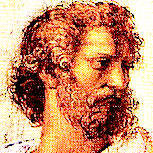 Aristotle AristotleFamous student of Plato and teacher of Alexander the Great, the first to organize a group to do scientific research, to systemize Western philosophy, to formalize a system of logic and to develop a theory of evolution; Aristotle is considered "The First Teacher" by Muslims and a profound influence on Judaism and Christian theology that extended through the Renaissance and continues today. Though only about one third of his writings remain and much more a proponent of the words rather than the sense, Cicero described him as "a river of gold,” Dante as “the master of those who know,” and through 1500 years of European history, “the philosopher.” He taught virtue as the secret of happiness, politics as the art of compromise between classes, and politically creating a balance between faith and reason, equality and freedom. |
| Pyrrho | 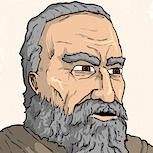 Pyrrho PyrrhoFather of the skeptic school of philosophy, painter influenced by Democritus into philosophy, and venerated high priest of Elis; Pyrrho travelled with Alexander the Great to India, met Magi and Eastern wise men who inspired his philosophy and lifestyle. Learning some Buddhism, he brought the Three marks of Existence teachings (suffering, impermanence, and egolessness) into the West and taught that for every statement, it’s opposite can be proposed with equal justification. A huge influence on the modern skepticism of Descartes, he was so respected and appreciated in his own time that philosophers were made exempt from taxation. |
| Philip French | 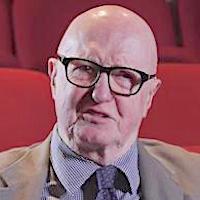 Philip French Philip French Film critic, radio producer, and journalist; French regularly wrote columns in The Observer for 50 years. Described as "an inspiration to an entire generation of film critics," his comments became almost legendary and it's estimated that he saw over 14,000 films. |
| Antisthenes | 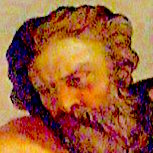 Antisthenes AntisthenesCreator of a religious tradition without religion Founder of the “Cynic” philosophy (named after the place he taught, Dogfish), student of Socrates and with him when he died, plagiarized by Plato, and teacher to Diogenes who made his teachings famous creating a “religious order without religion;” Antisthenes taught that the wise follow the sense and not the words, virtue instead of laws, insight instead of memes. Criticizing belief in universals, he questioned taking fame, fortune, pleasure and power as life priorities and modeled the value of a simple life in harmony with nature setting the stage for the early Christian ascetics. Dressing in the most common and worn clothes, he refused any pay for his teachings and preferred poor students. |
| Bahá'u'lláh | 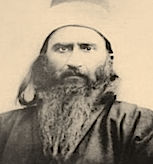 Bahá'u'lláh Bahá'u'lláhFounder of the Bahá'í Faith, persecuted, tortured, exiled and imprisoned for 40 years, considered a manifestation like Moses, the Buddha, Jesus and Muhammad; Bahá'u'lláh continued and expanded a tradition that had broken from Islam and started a new religion based on a Shambhala-like myth of a hidden good rising up in the future to overcome corruption and evil to establish a great golden age. He taught the unity of all mankind, all genuine religions, the equality of men and women, the compatibility of science and religion and that it is time now to create a global society with universal education, a bill of rights, respect for diversity, a democratically elected world government and collective security based on justice and equality with a world police force, language and currency. |
| Deganawida | 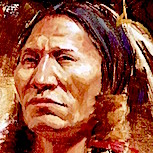 Deganawida DeganawidaFounder of the largest and most powerful Native American union, the Iroquois League, "The Great League of Peace" based on sharing and cooperation that established the world’s the oldest participatory democracy and brought a golden age to the native American tribes in the Great Lakes/ New York region for hundreds of years, Deganawida worked all his life bringing this vision to our world. Deeply admired by George Washington and Ben Franklin, this League was a big influence on the original thirteen colonies becoming one republic, on furthering the democratic principles included in the US Constitution, modeling and inspiring the League of Nations and now the United Nations. Identified by many members of the Bahá'í Faith with their founder Bahá'u'lláh, Deganawida continues as a voice of peace and sanity in our modern world. |
| Poggio Bracciolini | 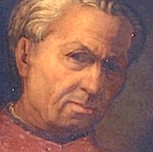 Poggio Bracciolini Poggio Bracciolini Gladiatorial orator, personal secretary to 7 popes including the “Antipope” John XXIII, scholar, early humanist, prolific and for his time astonishing writer; Poggio helped develop the Italic font, invented the Roman font still popular today, and helped spark a rebirth of old wisdom that led Europe out of the Dark Ages, into science and our modern age. Profuse traveller, friend to the great scholars of his time as well as politicians like Pope Nicolas V, Cosimo and Lorenzo de' Medici who supported his efforts to find and preserve ancient Greek and Roman manuscripts; he discovered and copied a large number of important classical works forgotten and decaying in old libraries including De Rerum Natura, Lucretius’ only surviving book. |
| Inayat Khan |  Inayat Khan Inayat KhanGrandson of famous musician and “Beethoven of India,” Ustad Maula Bakhsh and married to the cousin of Christian Science founder Mary Baker Eddy; Inayat Khan joined together esoteric mysticism with the magic of music and brought Sufism to the West. He warned against any blind belief systems and inspired visions of beauty, harmony and love. He taught that nature is the only holy book, self-realization the only truth, “unswerving progress in the right direction” the only religion, and all the children of earth our only true family. He traveled widely spreading his vision of seeing through the identifications separating people and harmonizing the East and the West. |
| Abraham Lincoln | 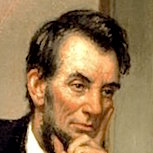 Abraham Lincoln Abraham LincolnGreatest American president, iconclast, skeptic, self-educated lawyer and congressman opposed to the Mexican–American War whose opposition to the expansion of slavery caused 7 slave states to form the Confederacy when he was elected president; Lincoln skillfully maneuvered between “War and Anti-War Democrats” who wanted to compromise with the South, “Radical Republicans” who wanted to harshly punish the South, fixated secessionists, and British interventionists. His oratory and common sense helped guide the USA through its biggest political and moral crisis while abolishing slavery, preserving the Union, and modernizing the economy. Using the army to protect escaped slaves, he closely supervised the war and planned a compassionate rebuilding of the South until his assassination. |
| Tao Yuanming |  Tao Yuanming Tao YuanmingGreatest Chinese poet during the Six Dynasties period (220 - 589 CE), one of the biggest poetic influences on Zen and Beat poetry, and in a small group of history’s best poets; stories say Tao Yuanming drained rivers of wine with friends in glades on moonlit nights celebrating the miracle and wonder of moment-to-moment perception. Military/government career drop out, back-to-the-land champion, discoverer of Peach Blossom Spring; he didn’t follow in the steps of any religion, didn’t do any of the recommended practices; he reveled in the fulness of here-and-now working in his garden, reading books, playing the zither, chopping wood and carrying water. |
| Phidias | 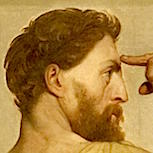 Phidias PhidiasGreatest Greek Sculptor Greatest Greek sculptor, fashioner of the 43’ Statue of Zeus at Olympia (one of the Seven Wonders of the Ancient World), and close friend to Pericles; history credits Phidias with the development and design of Classical Greek sculpture. He supervised and helped create the great works on the Acropolis in Athens, designed the statues of Athena inside the Parthenon that had 2345 lbs of gold on just the robe, and a colossal bronze Athena Promachos, symbol for Athens and goddess of wisdom. His work was described as “the most beautiful images on earth,” all who could afford it made pilgrimages to it, and hundreds of years later a Roman author described his work as an addition to religion “equal to a god.” |
| Hypatia | 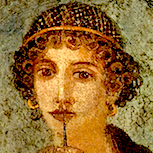 Hypatia HypatiaGreek female philosopher, physicist, astronomer, mathematician, and head of a Neoplatonic tradition living and teaching in Egypt; Hypatia was known as a symbol of virtue even by many Christians who thought of her as far above the other philosophers of her own time. Considered the first famous "witch" tortured by Christians whose leader was later sainted, historians mark her murder by this mob as the end of Classical antiquity, the downfall of Hellenistic philosophy. Famous through history and referred to by historians, philosophers, feminists, scientists, and novelists; she is still popular today and associated with names like Marcel Proust, Carl Sagan, Umberto Eco, Dr. Who, and modern movies like Rachel Weisz’s 2009 Agora. |
| Pearl Buck |  Pearl Buck Pearl BuckGrowing up and living in China as the daughter and wife of Christian missionaries, Pearl Buck described their arrogance and manipulation arguing against the benefit of missionaries and an institutional church. Denounced in China during the cultural revolution and prevented from visiting with Richard Nixon, she wrote 60+ books, won a Pulitzer, and became the first American woman to win the Nobel Prize for Literature. Long before they became popular or safe positions, she publicly challenged gender and racial discrimination while founding the first interracial and international adoption agency that placed over 5000 “unadoptable” children. |
| Thomas Carlyle | 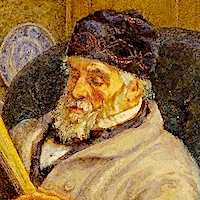 Thomas Carlyle Thomas Carlyle"Great Man” theory of history creator Historian, philosopher, translator, mathematician, and one of his era’s most influential social commentators; Carlyle developed the “Great Man” theory of history. He postulated and described how the world’s great changes were all caused by the decisions and actions of a very small and elite group of prime movers. He emphasized the essence of heroism as a response to intense challenge and difficulty rather than inherent qualities. In later life, these ego-based theories unfortunately led to a critique of democracy, justifications for fascism, nostalgia for slavery, and support for repressive government. His work in mathematics led to innovative methods still used today and one of his books on the French Revolution inspired Dickens' novel, A Tale of Two Cities. |
| Teresa of Avila |  Teresa of Avila Teresa of AvilaIn a time caught up in the fury and violence of religious intolerance, inquisitions and sectarian war: Teresa symbolized a child-like devotion and surrendering to a forgiving and compassionate god. Saint, reformer, founder of 40 Carmelite monasteries, author and theologian; with deep insight she championed and helped establish a tradition for western mysticism and was the first in the West to harmonize a scientific view with contemplation and a mystical understanding. An inspiration for the Spanish Renaissance and Christian meditation practice, she promoted “mental prayer” and a personal approach to spirituality. |
| Chuang Tzu | 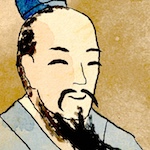 Chuang Tzu Chuang TzuIn a very real way, all of Chuang Tzu’s writings are a commentary on the Tao Te Ching. And by far, the best. Many consider him to be like Plato was to Socrates, like Paul was to Jesus, like Mencius was to Confucius, like Ashoka was to the Buddha… responsible for spreading the message of their teacher to the bigger world. Ridiculing rigid Confucian principles, he champions the sense instead of the words, the non-thought lineage, and true wisdom in daily life. His teachings emphasizing the interdependence of all things both inspire and foreshadow our modern ecological perspective. |
| Lūipa | 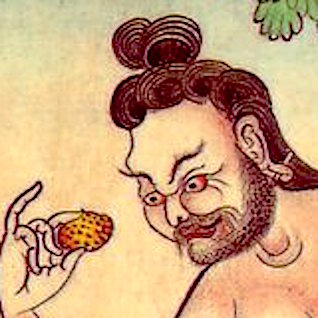 Lūipa LūipaMahasiddha #1 In the noble but uncommon tradition of the 1% voluntarily equalizing wealth, Luipa disdained his excessive riches and though born a king, like the Buddha he left his kingdom for a spiritual path. More than just his wealth though, Luipa’s teacher gave him a practice of abandoning his royal blood/Brahmin, food-purity culture prejudice by for 12 years eating only the fish guts normally intended only for dogs. This made him an untouchable and closed the door back to his former status and privilege. As a mendicant sage, he became an important teacher to many and passed into legend. |
| Cato | 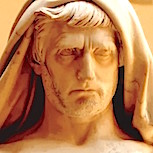 Cato CatoIncorruptible politician, insightful Stoic philosopher, long-time stubborn rival and opponent to Julius Caesar’s despotism; Cato was one of the most active defenders of the Roman Republic and his suicide was considered by later Romans a great psychological and cultural victory over Caesar's tyranny. Hero in Virgil’s Aeneid, mentioned in the first paragraph of Moby Dick, immortalized through the ages in plays, novels, poetry, opera, and television; Dante described him in Purgatorio as a “saved soul” who was “worthy of so much reverence that never a son owed his father more.” Immune to bribes and corruption, he became a symbol for individual liberty over governmental tyranny; democracy over monarchy, reason over belief and superstition; Cato greatly influenced George Washington and the founding of the US government. |
| Philodemus | 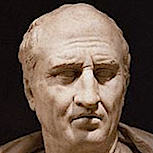 Philodemus PhilodemusInnovative philosopher-poet, student of Epicures and Zeno, first generation Epicurean, praised by Cicero, and a big influence on Horace; Philodemus was originally most well known for his poetry. However since 1738 when the ancient papyrus scrolls of Herculaneum were discovered under lava flows from Mt. Vesuvius that also destroyed Pompeii and with the help of x-rays and computers in recent years, his influence was discovered to extend to music, history, ethics and theology. |
| Ibn' Arabi |  Ibn' Arabi Ibn' Arabi“the foremost spiritual leader in Muslim history” Islamic Scholar, Sufi mystic, poet, philosopher and genuine saint; Ibn ‘Arabi was born during and at the center of a time and place where Christian, Jewish, and Islamic thought were cross-pollinating with a rediscovery of ancient Greek and Roman wisdom. In over 350 literary works including some of the finest poetry in the Arabic language, he influenced Islam away from rigid orthodoxy toward a universal understanding that appreciates each person’s unique and personal spiritual path above doctrine and belief. A polarizing figure in Muslim culture, he’s known as either “the foremost spiritual leader and Sufi master in Muslim history” or as a heretic and apostate. |